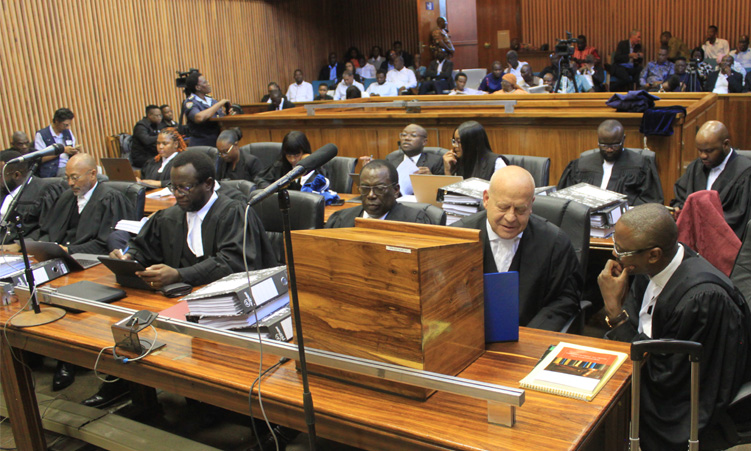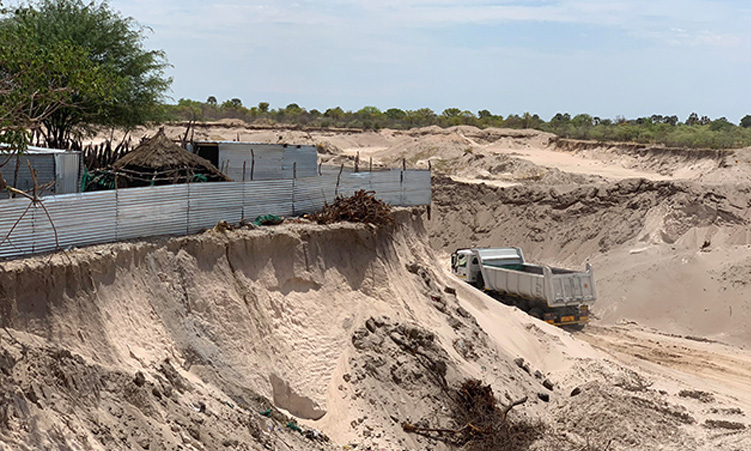Politicians are the same all over.
They promise to build bridges, even where there are no rivers. [Nikita Khrushchev] SOMETIMES a person wants to write big, so to speak. You feel like you want to cover the whole world in one go like in the tradition of Barrington Moore or one of those great writers who take broad historical approaches.But this a difficult feat to attempt within a newspaper column.So, one has to settle for a less ambitious task.And this is what I set out to do.My last column on ‘Choice and Citizenship’ touched on one aspect of democracy – the issue of choice.The present column will deal with another plank of economic democracy.This is the question of chance, or what C.B.McPherson would call life chances.This is the view that every individual in society must be given a chance to achieve his or her full potential by accessing the country’s resources.Call it entitlement if you like.Here I revert back to my longstanding dissatisfaction both with how our economy is organised in practice and how it is conceived conceptually and philosophically.We have all, of course, bought into the capitalist agenda or, to use a more fashionable term: the free-market economy.But about 18 years of Namibian independence, and three or four decades on the continent, have all but disqualified textbook capitalism as an appropriate economic strategy for Namibia and perhaps elsewhere too.I think it was a serious oversight, if not a deliberate move by the leaders, to just willy-nilly inherit an economic system that had exploited Namibians for more than 100 years of colonial rule.The point is that capitalism seriously lacks a theory of social responsibility and justice.And this is evident everywhere.Some of our major programmes that we keep talking about such as Vision 2030 and even the Millennium Development Goals (MDGs), for example, do not come close to addressing issues of economic justice and rights, the constant talk about poverty reduction notwithstanding.In fact, nothing concrete is done to address the perennial question of poverty.There are many pointers to show that the conditions of many Namibians are worsening.One of the glaring signs of increasing poverty in the country is eloquently expressed in the type of dwellings that are mushrooming in major cities and towns all over the country.The country is building more shacks than decent homes – pointing to a nation whose economic prospects are dwindling, at least for the majority.It also points to poor planning and skewed priorities at the national level.So, all the programmes such as the MDGs, NDPIII and Vision 2030 are thoroughly enclosed in the capitalist agenda.I know it is no longer fashionable in this age of globalisation to point out the historicity, specificity and contestability of capitalism as an economic, social and moral system.So everything is given – capitalism is timeless.But it is not.In essence, these programmes have hegemonic functions to perform.The function of hegemony is to protect the elite from “the trampling and roar of a bewildered herd” (the masses) to use Walter Lippman phraseology.Thus the bewildered herd is always promised some paradise in the future, not the present.Come this September, world leaders will converge in New York to review “progress” towards achieving the MDGs.I’m sure the conclusion will sound like this: a lot has been achieved but more needs to be done.The usual bureaucratic-speak.Unfortunately many uncritical academics are trapped in this kind of hegemonic agenda and they talk approvingly of these programmes like politicians.And as Archie Mafeye would write in retrospect: “In an era of new-liberalism since the collapse of Soviet ‘socialism’, it is fashionable to confess the social injustices of the past while upholding the principles and prescriptions of neo-classical economic orthodoxy.”We don’t seem to get out of this system though.Given Namibia’s relative wealth and its small population, many commentators both here and abroad thought the country was going to look like one of those oil-rich Arab Emirates.This was even the view entertained by the liberation movement before Independence.But this was not to be.These hopes have now been dashed and many Namibians are literally staring into the ugly face of poverty.But even at the level of praxis, the situation is hopelessly gloomy in Namibia.Because free-market economies elsewhere, but with a strong welfare systems in place, have done much better.People in those countries have pushed for government-protected minimum standards of income, nutrition, health, housing and education for every citizen.That these are not assured to the majority of the population here depends on how the country’s resources are raised and used.Here public resources are used to enrich a minority of the population, mainly those in positions of power and those connected to them through family, ethnic or racial ties but not the majority.The other reason is simply misplaced and skewed development priorities.Or what one commentator called the ‘criminal waste of money’.The question is do you rather build a new state house, office block or do you build more classrooms and recruit more teachers? People here are literally stealing public resources to enrich themselves and their foreign counterparts – done through phoney tenders and concessions.The diamond and fishing sectors are two of the areas that are open to abuse both by well-connected locals and foreigners alike.Our fish provide more jobs in Spain than here and soon our diamonds will do likewise for Israel.I think it’s high time we set up a commission of inquiry to look into how the diamond industry is being run.What is the role of the Diamond Commissioner, for example, and where does Namdeb fit in here? Are we, finally, trapped between two contradictory imperatives? Legitimation and accumulation? The point is that every person has the right to the satisfaction of her or his basic needs.That has been the demand of democratic politics in the past, present and the future.You feel like you want to cover the whole world in one go like in the tradition of Barrington Moore or one of those great writers who take broad historical approaches.But this a difficult feat to attempt within a newspaper column.So, one has to settle for a less ambitious task.And this is what I set out to do.My last column on ‘Choice and Citizenship’ touched on one aspect of democracy – the issue of choice.The present column will deal with another plank of economic democracy.This is the question of chance, or what C.B.McPherson would call life chances.This is the view that every individual in society must be given a chance to achieve his or her full potential by accessing the country’s resources.Call it entitlement if you like.Here I revert back to my longstanding dissatisfaction both with how our economy is organised in practice and how it is conceived conceptually and philosophically.We have all, of course, bought into the capitalist agenda or, to use a more fashionable term: the free-market economy.But about 18 years of Namibian independence, and three or four decades on the continent, have all but disqualified textbook capitalism as an appropriate economic strategy for Namibia and perhaps elsewhere too.I think it was a serious oversight, if not a deliberate move by the leaders, to just willy-nilly inherit an economic system that had exploited Namibians for more than 100 years of colonial rule.The point is that capitalism seriously lacks a theory of social responsibility and justice.And this is evident everywhere.Some of our major programmes that we keep talking about such as Vision 2030 and even the Millennium Development Goals (MDGs), for example, do not come close to addressing issues of economic justice and rights, the constant talk about poverty reduction notwithstanding.In fact, nothing concrete is done to address the perennial question of poverty.There are many pointers to show that the conditions of many Namibians are worsening.One of the glaring signs of increasing poverty in the country is eloquently expressed in the type of dwellings that are mushrooming in major cities and towns all over the country.The country is building more shacks than decent homes – pointing to a nation whose economic prospects are dwindling, at least for the majority.It also points to poor planning and skewed priorities at the national level.So, all the programmes such as the MDGs, NDPIII and Vision 2030 are thoroughly enclosed in the capitalist agenda.I know it is no longer fashionable in this age of globalisation to point out the historicity, specificity and contestability of capitalism as an economic, social and moral system.So everything is given – capitalism is timeless.But it is not.In essence, these programmes have hegemonic functions to perform.The function of hegemony is to protect the elite from “the trampling and roar of a bewildered herd” (the masses) to use Walter Lippman phraseology.Thus the bewildered herd is always promised some paradise in the future, not the present.Come this September, world leaders will converge in New York to review “progress” towards achieving the MDGs.I’m sure the conclusion will sound like this: a lot has been achieved but more needs to be done.The usual bureaucratic-speak.Unfortunately many uncritical academics are trapped in this kind of hegemonic agenda and they talk approvingly of these programmes like politicians.And as Archie Mafeye would write in retrospect: “In an era of new-liberalism since the collapse of Soviet ‘socialism’, it is fashionable to confess the social injustices of the past while upholding the principles and prescriptions of neo-classical economic orthodoxy.”We don’t seem to get out of this system though. Given Namibia’s relative wealth and its small population, many commentators both here and abroad thought the country was going to look like one of those oil-rich Arab Emirates.This was even the view entertained by the liberation movement before Independence.But this was not to be.These hopes have now been dashed and many Namibians are literally staring into the ugly face of poverty.But even at the level of praxis, the situation is hopelessly gloomy in Namibia.Because free-market economies elsewhere, but with a strong welfare systems in place, have done much better.People in those countries have pushed for government-protected minimum standards of income, nutrition, health, housing and education for every citizen.That these are not assured to the majority of the population here depends on how the country’s resources are raised and used.Here public resources are used to enrich a minority of the population, mainly those in positions of power and those connected to them through family, ethnic or racial ties but not the majority.The other reason is simply misplaced and skewed development priorities.Or what one commentator called the ‘criminal waste of money’.The question is do you rather build a new state house, office block or do you build more classrooms and recruit more teachers? People here are literally stealing public resources to enrich themselves and their foreign counterparts – done through phoney tenders and concessions.The diamond and fishing sectors are two of the areas that are open to abuse both by well-connected locals and foreigners alike.Our fish provide more jobs in Spain than here and soon our diamonds will do likewise for Israel.I think it’s high time we set up a commission of inquiry to look into how the diamond industry is being run.What is the role of the Diamond Commissioner, for example, and where does Namdeb fit in here? Are we, finally, trapped between two contradictory imperatives? Legitimation and accumulation? The point is that every person has the right to the satisfaction of her or his basic needs.That has been the demand of democratic politics in the past, present and the future.
Stay informed with The Namibian – your source for credible journalism. Get in-depth reporting and opinions for
only N$85 a month. Invest in journalism, invest in democracy –
Subscribe Now!









